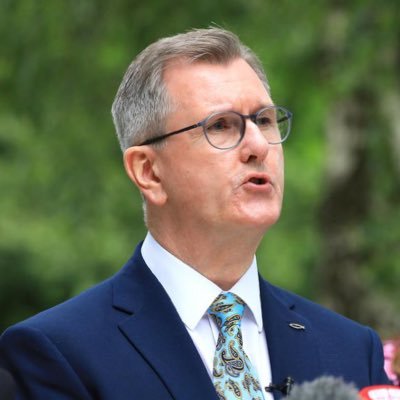Sir Jeffrey Donaldson has been officially approved as the Democratic Unionist Party’s (DUP) new leader, promising to “right the wrong” of the Northern Ireland protocol.
After revolts between party members overthrew both Edwin Poots, who served for 21 days, and his predecessor, Arlene Foster, the Lagan Valley MP was the sole person to put their name forward.
Donaldson got 32 votes from the party’s 36-member electoral system at a County Antrim hotel. In reality, his ascension had been all but assured for many days, with the party’s chairman declaring that only documentations remained.
The DUP’s designate leader restated that the Northern Ireland protocol would be his primary focus during his tenure as party leader.
Donaldson has made a stunning comeback. Those same officers chose Poots over Donaldson in a 19-17 vote in mid-May, only for Poots to resign last week after failing to seek their approval to fill the top position in Northern Ireland’s power-sharing government.
Donaldson is unlikely to make such a basic error. He’s made a career out of recognising and never testing the boundaries of what British unionists in Northern Ireland will endure.
Donaldson emphasized in his declaration seeking DUP leadership that his community cannot withstand the Northern Ireland Protocol, a clause of the Brexit withdrawal agreement that makes deal with the Republic of Ireland easier than with Britain. Unionists want to remain a part of the United Kingdom rather than join the rest of Ireland, as their Irish republican opposers do.
“Now, more than ever, we need to unite in the face of the threats posed to Northern Ireland by the protocol,” he said. “Make no mistake. This is the number one issue facing our country, our people and our place within the United Kingdom.”
After confirmation of his victory, Donaldson said he wants to tell U.K. Prime Minister Boris Johnson “it is not realistic to expect stability when every unionist representative in the devolved institutions opposes the Northern Ireland Protocol.”
Donaldson is frequently referred to as a party “centrist.” This is accurate in the sense that, in contrast to Poots, he possesses the respect and support of both the DUP’s Protestant evangelical and more firmly rooted wings. Additionally, he has a proven track record in diplomacy, which in the largely amiable realm of unionism primarily entails consistent participation in activities and media in the Republic of Ireland.
But in no way does this characterize him as a moderate or a progressive person. Donaldson will pose a more difficult bargaining challenge than the less experienced Poots, as is already known in London and will soon be discovered in Dublin and Brussels.
Donaldson established a reputation as a unionist who insists on clear and specific and binding agreements, especially for the opposing party, decades ago. Donaldson rejected the Good Friday peace agreement in 1998, when the Ulster Unionist Party — the dominant representative of British Protestants in Northern Ireland at the time — was about to support it. He was caught on camera leaving the talks location hours before they ended.

He switched sides to the more obstinate Democratic Unionists, who vehemently opposed the agreement since it admitted the Irish nationalist Sinn Féin party to the newly formed unity government in Northern Ireland without requiring the Irish Republican Army to disarm in retaliation. First attempts at power-sharing in Northern Ireland were ruined by this conflict, which also drove Protestants to the DUP. In 2007, the DUP did finally agree to work with Sinn Féin, but only after the IRA laid down its weapons and Sinn Féin formally acknowledged the Northern Ireland police.
Now, Donaldson makes indications that until Britain unilaterally relaxes or delays more implementation of protocol trade restrictions at Northern Ireland’s ports, he would remove the DUP from power-sharing, bringing down the administration once more.
While the DUP expects the UK government to make decisions soon to postpone the implementation of additional protocol rules, he has set a foreboding precedent should Britain disappoint.
“A failure to act,” Donaldson said, “will undoubtedly have consequences for the stability of our political institutions and the prosperity of our economy.”
Few facts about Jeffrey Donaldson
Sir Jeffrey, who was born in Kilkeel, County Down, began his political career in the mid-1980s as an electorate agent for South Down MP Enoch Powell, before becoming a personal assistant to veteran Ulster Unionist Party (UUP) leader James Molyneaux.
Mr. Donaldson was elected as the MP for Lagan Valley after Lord Molyneaux retired in 1997, and he has held the seat for the past six elections.
He is an Orange Order member and was a corporal in the Ulster Defence Regiment (UDR) during the Problems.
Mr. Donaldson announced his departure from the UUP in 2003, following lengthy opposition to the Good Friday Agreement and the leadership of David Trimble, later joining the DUP with Arlene Foster and Norah Beare.
In 2007, Jeffrey Donaldson was assigned to the UK Privy Council, a body that instructs the rulers, and resigned as MLA for Lagan Valley in 2010.
In 2016, he was knighted for political service.
Sir Jeffrey lost the DUP leadership election to succeed Arlene Foster in May 2021 by a vote of 19 to 17.
